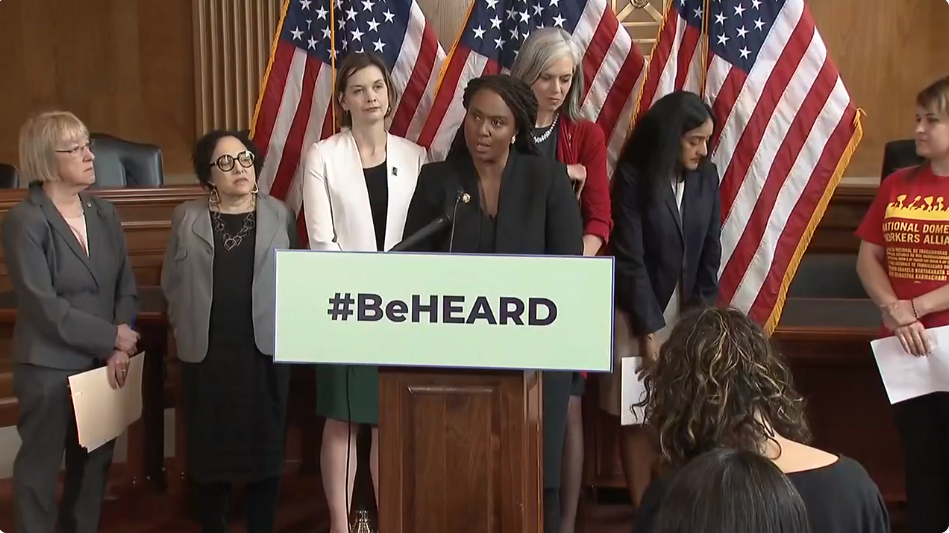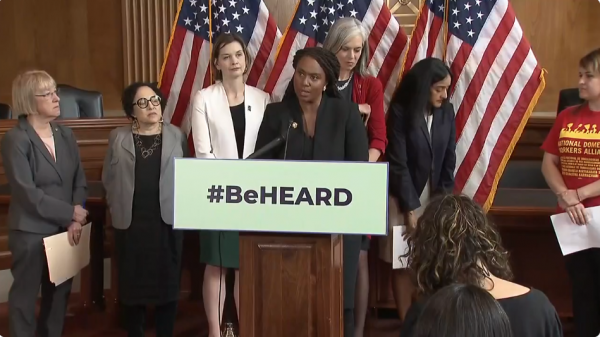Abortion rights, women of color, and LGBTQI+ people are under attack. Pledge to join us in fighting for gender justice.
Congress Finally Introduces Groundbreaking Workplace Harassment Legislation For the Rest of Us


Today, the Bringing an End to Harassment by Enhancing Accountability and Rejecting Discrimination (BE HEARD) in the Workplace Act was introduced in Congress by 19 Senate Democrats and four House Democrats, and with more than 50 civil, women, and workers’ rights organizations endorsing the bill.
We, as a country, have long owed workers cultural and institutional change to ensure that all people can work with safety, dignity, and respect. Over the past year and a half, the country has witnessed an unparalleled reckoning and demand for accountability for and prevention of sexual violence, including workplace sexual harassment and sexual assault –a reckoning that was only possible because of years of activism and leadership by Tarana Burke, her Me Too movement, and many survivors and activists.
Why Now?
While initial media attention in October 2017 focused on women in entertainment, calls for accountability and action reverberated across the country and around the world. Farmworker women penned an open letter expressing solidarity with women in entertainment, who then created TIME’S UP, an organization dedicated to preventing abuse and ensure equity for working women in Hollywood and beyond. Workers across industries, in companies as diverse as McDonald’s and Google, took action demanding stronger workplace rights and safety. Over 200 advocacy organizations issued a call for large-scale cultural, institutional, and legal reform. Several states enacted legislation to address workplace harassment. And the TIME’S UP Legal Defense Fund, housed at and administered by the National Women’s Law Center Fund LLC, has connected over 3,000 individuals facing workplace sex discrimination with legal and public relations assistance.
For years, workers and advocates have been calling for critical reforms in our laws to address the power disparities and working conditions that have allowed harassment and other forms of discrimination and sexual assault to persist. While workers in virtually every industry experience harassment and discrimination, low-wage workers in service industries, like restaurant and retail, and domestic workers—the majority of whom are women of color, Indigenous women, and immigrants— as well as women in male-dominated fields, are especially vulnerable. And yet, these same workers are frequently left out of core civil rights protections.
The increased media attention to, and public awareness of, harassment and sexual assault in the last 18 months have provided an important opportunity to drive substantive legal reform. Now, there’s a bright light shining on advocates’ longstanding calls for institutional change, including the need to: extend protections against harassment and other forms of discrimination to all workers, including independent contractors and those in the growing gig economy; address barriers to seeking justice; dismantle the culture of secrecy around harassment and discrimination that protected serial harassers; and invest in legal services and robust prevention efforts.
What’s in the Bill?
Comprehensive federal legislative reform was the crucial missing piece – until now. The BE HEARD in the Workplace Act is the first federal legislative proposal of its size and scope offered in the wake of #MeToo going viral. It is a bold and direct response to many of the concerns highlighted by workers. The bill offers a package of reforms to prevent and address all forms of workplace harassment and discrimination. The proposed reforms include:
- Extending protections against harassment and other forms of discrimination to more workers;
- Removing barriers to access to justice, such as short statutes of limitations and restrictively interpreted legal standards;
- Promoting transparency and accountability by limiting the use of confidentiality agreements that silence workers; and
- Requiring and funding efforts to prevent workplace harassment and discrimination.
The introduction of the BE HEARD in the Workplace Act is only possible because of the tenacity and courage of survivors and advocates, who spoke truth to power and demanded change. This bill offers an unprecedented opportunity to deliver powerful, lasting, long overdue, change for working people nationwide, across all industries and occupations. It is essential to creating the world we want, where every individual may work with equality, dignity, and safety. Our nation’s workers – we – deserve nothing less.





